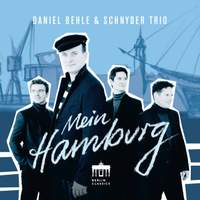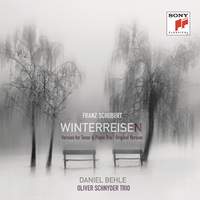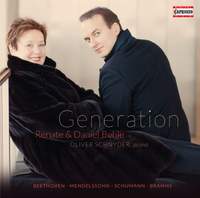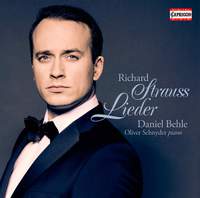Interview,
Daniel Behle on Mozart, Wagner and Mein Hamburg
 Daniel Behle's Ferrando in the Royal Opera House's current production of Così fan tutte was quickly and widely hailed as one of the most exciting Covent Garden débuts in some time: it's a largely unshowy and deceptively difficult role, but the classy German tenor's immaculate delivery of Un aura amorosa (the young soldier's naive but sincere Act I lovesong to the woman who'll shortly be duped into a roll in the hay with his best friend) literally stopped the show on the night I attended, and prompted The Observer to declare that his 'sensational performance' of the aria was 'the standout moment' of the entire production.
Daniel Behle's Ferrando in the Royal Opera House's current production of Così fan tutte was quickly and widely hailed as one of the most exciting Covent Garden débuts in some time: it's a largely unshowy and deceptively difficult role, but the classy German tenor's immaculate delivery of Un aura amorosa (the young soldier's naive but sincere Act I lovesong to the woman who'll shortly be duped into a roll in the hay with his best friend) literally stopped the show on the night I attended, and prompted The Observer to declare that his 'sensational performance' of the aria was 'the standout moment' of the entire production.
I had lunch with Daniel in London between one of the final rehearsals and the Insight Evening for Cosi (which you can watch in full here), and asked him about his thoughts on the production, his innovative recording plans (he's also a talented composer and arranger), and his imminent debuts in several Wagner roles…
Così fan tutte has to be one of the most elusive, slippery works in the operatic repertoire: what can you tell me about Jan Philipp Glöger’s take on the piece?
I think we've found a good way to tell the story as it should be, but also to bring new ideas into it. I don’t want to spoil anything, but when I fall for Fiordiligi even though I’m still with Dorabella – when does that happen in this piece? Well, in this production it always differs. At the end, of course, I fall for her much harder than Guglielmo falls for Dorabella: it’s a stronger, more passionate relationship so it takes longer, whereas the other two just have a one-night stand (though in this production we don’t show any explicit stuff, just what needs to be shown). Now Dorabella and Fiordiligi aren’t stupid (we’re playing real theatre here), but it’s always hard to get round the idea that the girls don’t recognise the men - so here they do recognise us, but they play along. Some of the dialogue Da Ponte writes in the Act II finale focuses on the real surprise of the women, which is a bit hard to play if they already know, but we've found a decent way to make this work.
This is your Covent Garden début: how did that come about, and how are you enjoying the venue?
I auditioned four years ago, actually for a heavier Russian piece, but things went so well that I was basically given carte blanche at this house, and we decided on Così for my début. Covent Garden is one of the best houses for lyrical voices in the world - there’s never the need to shout or push. I am also looking forward to my return in Königskinder, too; they hired me for the lyric stuff I’ve been singing for 12 years and also for the newer stuff (I first sang Königskinder in 2012). I am very happy that they see the way my voice develops; let’s see what happens after Bayreuth 2017...
Did you always harbour Wagnerian aspirations?
Well, I’m the son of my mother [the dramatic soprano Renata Behle] and she sang Wagner for 20 years: I remember watching her beside vocally dying tenors, over and over again, when I was growing up! She started as a mezzo, then was a dramatic soprano, and now she decided to be a mezzo again; she’s now been performing for over 50 years! She is also my teacher: I studied with the American tenor James Wagner for six semesters, but when he died in 2003 I finished my studies with my mother before I took my first engagement in Oldenburg, then the Volksoper Wien, then Frankfurt. I was told if you sing too much Wagner too early in life it takes revenge, but I start [at Bayreuth] with lighter roles like David (in Die Meistersinger) and Froh. Though I do Loge (in Das Rheingold) on tour around Europe with Thomas Hengelbrock I am not heading for my first Siegfried. But it seems to be possible to sing Wagner without any harm to my voice and fulfill the necessities of what is expected.
Will you continue singing baroque and bel canto repertoire alongside your new, heavier roles?
Absolutely. For example in 2018 I do La donna del Lago in Lausanne and will finally have my "Gluck Arias" Tour - also at Wigmore Hall. Let’s see how it works out in 2018 …I asked my agent to schedule a pause of three weeks before the Rossini where I'm not singing any heavy stuff, just to bring the voice back into the higher tessitura. What doesn’t work in Rossini is to give a push as you would in other roles where it suits – ie here in Tradito, schernito (in Act II of Così), I have to bring tension into the voice to suit the character and the drama, but in Rossini, it’s always light, it’s always fun, and when it’s dramatic you really have to be on your toes.
I might decide I’ll do an Italian arias CD like I did for the Hamburg project, where I did twenty songs in my own arrangements…
Tell me a little more about that...
Six songs are completely my own – and I also set some songs by Offenbach and [Adolphe] Adam, with new texts and in new arrangements for piano trios. I worked on it for almost three years - but only when I was on location for a production, because when you’re at home with two children you can’t compose! Somewhere in Sweden I did a song about a German soccer club…it’s very funny, every song I have such a clear picture of where it was written! My Winterreise I did completely between 3am and 7am, with my daughter sleeping next to me: my wife wanted to sleep, so I sat there with my laptop and arranged Winterreise! Now that was a lot of work, even before I wrote the first note, because I had to write out the entire score on my notation programme before I could start my own arrangement. I almost see my work on it as a sort of photograph-negative of the way Hans Zender did it. Zender puts the focus on the outside - he transcribes the winter, the weather, what surrounds him, but what’s inside him? He leaves that to Schubert. I do it with just two string parts, it’s all very subtle: it’s just one interpretation of Winterreise, but very much my personal one.
On the new disc there are some songs from the silent film era (in fact some of the very first films with sound, like Auf dem Reeperbahn), and I’ve also done Granada – but rewritten about Hamburg! Then we did a Beatles song, Honey-Pie (because of course The Beatles started their career in Hamburg), but recreating the sound of a broken record – so it jumps, it speeds up, it slows down. There’s also some Offenbach (a song from La belle Hélène), with a new text about North German men and how they’re different to Italian men… ! Coming up after that I’ve got a disc of Schubert’s operatic arias with the Orfeo Barockorchester, which is pretty awesome because Schubert arias are really not well known, and then I’m thinking about doing some more Strauss lieder: I’ve recorded all the favourites (Allerseelen, Zueignung, Befreit, Cäcilie and so on) already, but there’s a fantastic cycle called Der Krämerspiegel (The Shop-keeper’s Mirror) that’s hardly ever been recorded, and also the Gesänge des Orients really appeal, so maybe a disc focusing on obscure Strauss…
Daniel Behle's tribute to the city of his birth is released on 18th November on Berlin Classics.
Available Formats: CD, MP3, FLAC, Hi-Res FLAC
Other recordings referenced in this interview
This 2-CD set presents Schubert's dark night of the soul in its original version for voice and piano and in Behle's own arrangement for voice and piano trio.
Available Formats: MP3, FLAC, Hi-Res FLAC
Mother and son perform songs by Beethoven, Brahms, Liszt, Mendelssohn, Schumann, Wagner and Wolf.
Available Formats: CD, MP3, FLAC
'Behle reveals himself a nonpareil singer of [Gluck's] tenor roles. His lithe, athletic instrument has a pingy bravura quite unlike that of any other singer of this music I know.' (Sunday Times)
Available Formats: MP3, FLAC
'An easy confidentiality never allows over-inflection...Behle is also able to bring a heroic sheen to the refulgent climaxes, which makes comparison with Jonas Kaufmann not inappropriate; but in any case this is a tenor with a candid, easy approach all his own.' (BBC Music Magazine)
Available Formats: CD, MP3, FLAC







